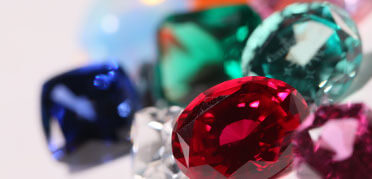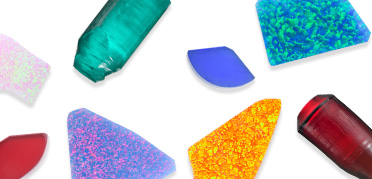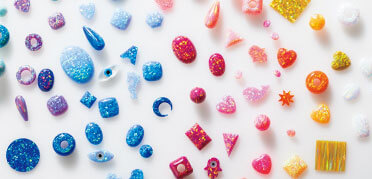Jewelry Glossary
-
L
-
Lab-grown Diamond
It was in 1970 when we succeeded in producing gem-quality lab-grown diamonds. These diamonds came to the market in 2002. They can be grown by HPHT or CVD method and CVD is the mainstream nowadays.
Recently, fewer and fewer people care about where the gem is from; instead, their focus is more on how sustainably it was made. As a result, lab-grown diamonds have attracted attention from around the world. -
Labradorescence
A rainbow-like glow seen in labradorite. Cracks and thin stone layers of the stone disperse light into seven colors.
-
Labradorite
Labradorite was discovered in Labrador Peninsula in Northeastern Canada in 1770 and later mined in Russia and Finland. The one that shows strong labradorescence is also called "spectrolite." Transparent orange, yellow, green and blue labradorite without labradorescence is usually polished to facet cut.
[Moh's hardness: 6] [Mineral species: Labradorite] -
Landscape Agate
Landscape agate is also called "scenic agate."
It is transparent chalcedony with a pattern that looks like a brownish or reddish scenery.
This pattern is created due to the incorporation of other elements while crystallizing.
Agate with a tree like or fern leaf pattern is called "dendritic agate."
[Moh's hardness: 6] [Mineral species: Chalcedony] -
Lapidary
The process and machine for lapidary differ depending on facet cut or cabochon cut. For cabochon cut, the process is usually orientation, trimming, grinding, sanding, and polishing.
-
Lapis Lazuli
Lapis-lazuli contains 20-40% lazulite, calcite, diopside, hauyne, sodalite, etc. The name of Lapis-lazuli is from "allazward" in Greek which means blue sky, so the stone color is blue. Lapis-lazuli is one of the Buddhism's seven treasure.
[Moh's hardness: 5] [Mineral species: Lapis Lazuli] -
Lariat Necklace
A lariat necklace is a long and flexible necklace with decorative parts at each end.
-
Larimar
Since the beautiful quality of light blue pectolite had been discovered in Dominica in 1974, it was given the name of gemstone called larimer. The US jewelers started to sell it as a gemstone from the Caribbean jewelry in 1985. Lari represents a girl's name, and marl means the sea in Spanish. Like amber and conch pearl, it is said to be the three important jewels of the Caribbean. Larimar with deep blue and a clear pattern is considered high quality.
[Moh's hardness: 4.5-5] [Mineral species: Pectolite] -
Laser Stereolithography
Laser stereolithography is a processing method that makes a resin jewelry prototype/mold with a stereolithography apparatus. Using this device, you can create an ultraviolet curable resin prototype from 3D design data designed on a computer. This resin model is cast once in silver and then mass-produced through a similar process using the lost-wax casting method.
-
Lavender Jade
Jade is a gemstone with various colors: white, black along with 7 other colors.
Among them there's "ice jade" whose color is white or colorless and is especially rare.
Green imperial jade is the most valuable jade but lavender jade which is purplish jade is also highly prized.
[Moh's hardness: 6] [Mineral species: Jadeite] -
Lazulite
Lazulite is named after a lazurstein, meaning "blue stone" in German. The transparency range is from transparent to opaque, but large and highly transparent ones are limited. Sometimes it is cut into a facet cut as a collector's stone, but cabochon or beads would be better if you wear it because moh's hardness is low.
[Moh's hardness: 5] [Mineral species: Lazulite] -
Leg Chain
Please refer to "anklet."
-
Lemon Setting
Lemon setting is a technique for bead setting.
It is named as the curved mark looks similar to the shape of a lemon. The gemstone is fixed by two prongs (top and bottom) for this setting. -
Locket Pendant
A locket pendant is a pendant with a lid that allows you to hold a photo inside.
-
Loop Tie
The "loop tie" is a piece of jewelry made of braided rope or leather string that hangs around the neck of a shirt, with the ends hanging down in front, and fastened at the bottom of the neck with clasps.
-
Loose Stone
Gemstones that have been cut and polished but not yet set in a flame.
-
Lost Wax Casting
Lost-wax casting is a method of metal processing based on wax prototypes, or metal molds produced by wax modeling.
In the case of mass production, a tree-like wax is coated with a refractory material and metal is cast into a mold after dewaxing.
This casting can be done after stone setting but only gemstones with high heat resistance are compatible with this process. -
Lot
A particular set or group of things is often used as the trading unit of gemstones and jewelry.
-
Lower Bezel
The lower bezel refers to the inside of a ring that rests against the finger. A well-fitted ring feels smooth to the touch and doesn't have any corners.
-




